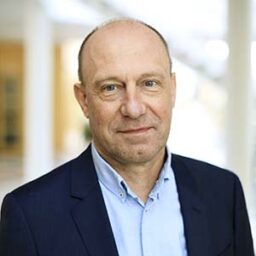
PHI: “We aim to revolutionize the regenerative medicine market “
A year ago, Patrik Eschricht assumed the role of CEO at PHI, heralding the shift towards regenerative medicine and a commitment to enhancing shareholder value. This transition was further underscored by the entry of private Swiss distributor and investment company Altium as a major shareholder. BioStock talked to Patrik Eschricht to reflect on the past year and explore his vision for the company’s future.
Phase Holographic Imaging (PHI) has developed the HoloMonitor system for non-invasive time-lapse imaging and long-term quantitative analysis of living cell cultures. In 2022, PHI transitioned its focus from pre-clinical cell-based research to regenerative medicine and cell quality control applications, an emerging field with significant potential.
Roughly one year later, private Swiss distributor and investment company Altium saw the business opportunities presented by PHI. Altium is now a major investor of PHI with 24,61 per cent of the stocks, and its CEO, Goran Dubravčić, serves as PHI’s Chairman of the Board. Read an interview with Dubravčić here, where he discusses the potential he sees in PHI.
A new CEO at the helm
In January 2023, PHI’s CFO, Patrik Eschricht, was appointed as the new CEO. Since then, the company stock price has surged by an impressive 232 per cent in just one year. The market embraced the management transition, coupled with the momentum gained by the entry of Altium as a major stakeholder.
The companies now work tightly together. PHI focuses on establishing its HoloMonitor technology for new standards for cell quality control systems in regenerative medicine, while Altium amplifies PHI’s market reach by integrating its extensive network and industry know-how as a successful global distributor of laboratory solutions. In November 2023, Patrik Eschricht reflected on the company’s progress in an interview with BioStock. Read it here.

The CEO’s visions for the coming year
BioStock reached out to Patrik Eschricht again to get his impressions on the past year while also exploring his aspirations for the year ahead.
Patrik, can you start by giving a summary of your first year as PHI’s CEO?
– Well, we’ve set full sails on our transformative journey toward regenerative medicine. My previous experience in leading companies through rapid growth has been invaluable in navigating this past year, and I am proud of our achievements with a dedicated team beside me.
– A highlight of the year was the global market launch of our new HoloMonitor fluorescence product, which diversified our product portfolio and increased our offering to the market. Also, we’ve expanded our regenerative medicine efforts, notably through our active participation in industry events and networks like ARM and ATMP Sweden and spearheading the cell manufacturing projects with our partners at the Wake Forest Institute for Regenerative Medicine.
– And, of course, our new partnership with Altium, now a significant investor and global PHI distributor, has been a cornerstone of 2023. It reshaped our sales strategy, enhancing our market reach and allowing us to focus on our core business — advancing QPI technology and product development. The successful completion of our TO 3 series in May and a directed share issue to Altium in October not only fuelled our momentum but also affirmed our and our investors’ commitment to our future.
PHI is transforming as a company, but has your vision changed?
– No. While our aim to transform live cell analysis remains unchanged, the dynamic growth of the life sciences industry over PHI’s history presents us with unprecedented opportunities. Our non-invasive technology is now uniquely positioned to help transform the healthcare sector by creating new standards in cell quality control, making regenerative therapies more accessible.
You see non-invasive imaging as a key to making regenerative therapies safe, accessible, and affordable. Can you elaborate on that?
– The shift towards therapies using patient cells themselves is revolutionizing treatment approaches. For such therapies, the integrity of the cells must be preserved without using foreign substances for quality assessment or wasting costly resources and discarding any precious patient cells in the process. Cell-friendly quality control measures will ensure that future therapies are safe and that such healthcare becomes affordable and accessible to everyone. This is where our technology plays a pivotal role. Our method offers a non-invasive solution for cell quality validation, standing out as a potential standard for ensuring the quality of cell therapies of the future.
How has Altium contributed to the company’s recent developments?
– Altium’s involvement since becoming a major shareholder and active partner in 2023 has been pivotal to PHI’s growth and innovation. Their investments since March 2023 have provided a financial foundation while their global distribution network expands our HoloMonitor market reach, steering us toward robust sales and allowing our team to concentrate on advancing our development work within regenerative medicine. Goran Dubravčić, Altium’s CEO and now PHI’s Chairman of the Board, brings invaluable expertise from building a global distribution network, driving us into a future where PHI plays a key role in advancing regenerative medicine.
How does this partnership align with your long-term vision in regenerative medicine?
– Aligning with our vision for regenerative medicine, we’re shifting our focus from pre-clinical research to clinical applications within the much larger healthcare market. Our goal is to establish HoloMonitor and its QPI technology as the gold standard in cell quality control for regenerative therapies — an emerging pillar of healthcare alongside surgery and pharmaceuticals. Altium’s partnership significantly boosts our innovation capabilities as we focus on product development and advocating for QPI technology to key opinion leaders and government bodies. I see Altium also accelerating our future market reach, positioning us to capture the emerging regenerative therapies market effectively.
In what way has your collaboration with the renowned North Carolina-based research institute Wake Forest Institute for Regenerative Medicine (WFIRM) affected PHI?
– Our collaboration with the WFIRM really propels us to the forefront of regenerative medicine. With our own office and biomedical engineer embedded at WFIRM, we are active participants, for example, leading a key project in our technology development alliance with our ReMDO partners BioSpherix, SAS and QIAGEN. This partnership places us right at the heart of innovation, where we’re working together to set new standards for cell therapy quality control.
– It’s incredibly rewarding to see WFIRM recognize our HoloMonitor technology for what it truly is – an essential tool for non-invasive, cell-friendly quality control. This not only validates the importance of our work but also connects us deeply with WFIRM’s transformative mission to make regenerative therapies safer, more affordable, and accessible to everyone. It feels like we’re not just witnessing history; we’re actively shaping it.
Recently, WFIRM was awarded a USD 160 million 10-year US National Science Foundation Regional Innovation Engines grant. Will this potentially benefit your work – and business opportunities?
– We were excited to hear the news! The NSF grant awarded to WFIRM spotlights Winston-Salem as the global hub for regenerative medicine, a spotlight we now share through our partnerships and presence in the area. This grant’s full impact on everyone and our projects is unclear, but the heightened attention it brings to the region definitely makes us more visible and could lead to new business opportunities. Being in the epicentre of such significant advancements confirms our strategic positioning and aim for our cell analysis technology to be the gold standard for cell quality control in regenerative medicine.
How do you attribute the substantial sales increase during Q3 2023 to the recent changes in your sales approach?
– We’re thrilled by our sales performances in Q3 2023, which marks the highest sales numbers in PHI history. Part of these quarterly sales are purchase orders by five Altium subsidiaries. These HoloMonitor systems can support Altium’s sales initiatives, including product demonstrations at customer sites, aiming to catalyse further sales opportunities. We recognize the unique needs of academia and industry customers, who often prefer to evaluate our system within their own research lab environments. The approach of having ready-to-demonstrate systems ensures rapid responsiveness to such requests.
– This strategy is particularly relevant in common scenarios where potential customers of pre-clinical research labs are navigating the complexities and long processes of securing grant money or other funding for new research equipment. With average sales cycles spanning 6-12 months, we’re looking forward to seeing Altium’s impact during the second half of 2024. We expect Altium’s efforts to increase our geographic footprint and start to significantly contribute to our sales and cash flow during this period. All in all, seeing the growing interest in HoloMonitor in varied research applications over recent years is truly encouraging.
Following the sales discussion, what market prospects do you envision for HoloMonitor, particularly considering the growing regenerative medicine market?
– The need for standardized cell quality validations in the exponentially growing regenerative medicine market underscores the future potential of HoloMonitor for clinical applications. As we work towards creating these standards, PHI is becoming a key player in the healthcare revolution. The exponential growth in cell and gene therapies highlights an urgent need for a revised regulatory framework, a challenge we’re ready to meet head-on.
– For those interested in the emerging technologies that will shape our future regenerative therapies, the latest report by the Alliance for Regenerative Medicine (ARM) offers insightful perspectives. Read the report here.
The content of BioStock’s news and analyses is independent but the work of BioStock is to a certain degree financed by life science companies. The above article concerns a company from which BioStock has received financing.

